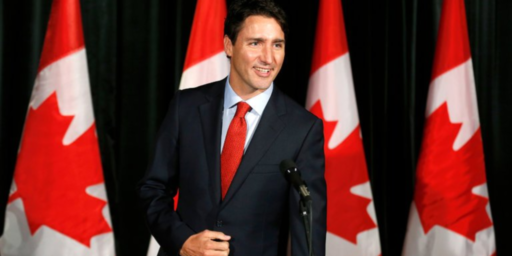Internet Overtakes Radio as News Source
There’s a flood of coverage out there on a new survey by the Pew Center.
Internet overtakes radio (The Age)
The Internet surpassed radio as a source for political news in the United States last year as more people went online to keep up with the presidential election campaign, according to a new report released today. Twenty-nine per cent of US adults used the Internet to get political news last year, according to the Pew Internet and American Life Project. That’s up from 4 per cent in 1996 and 18 per cent in 2000.
Television remained the dominant medium for most voters, but 18 per cent said they got most of their political news from the Internet, compared with 17 per cent who said they turned to the radio for their news. For those with a broadband connection at home, the Internet rivalled newspapers in importance.
Most Internet users surveyed said they voted to re-elect Republican President George W Bush, but supporters of Democratic challenger Sen John Kerry were more likely to say the Internet helped them settle on a candidate.
More People Turning To Online News (WebProNews)
During the 2004 presidential campaign, six times as many people used the internet to get political news as they did in 1996. The amount of people using newspapers for their political news on the hand, went down. A survey shows that 18% of adults in America used the Internet as one of two main sources of news about the presidential races. In 1996, only 3% made that claim. TV reliance went up from 72% to 78%.
6 times more Americans rely on Internet for political news (CST)
Reliance on the Internet for political news during last year’s presidential campaign grew sixfold from 1996, while the influence of newspapers dropped sharply, according to a study issued Sunday. Eighteen percent of American adults cited the Internet as one of their two main sources of news about the presidential races, compared with 3 percent in 1996. The reliance on television grew slightly to 78 percent, up from 72 percent.
Pew Finds Surge for Web as Source of Political News, As Newspapers Sink (E&P)
A Pew Center study released today found that using the Internet to get news of politics during the 2004 presidential contest grew sixfold from 1996, while the influence of newspapers sank. In 1996, only 3% of those surveyed called the Web one of their two leading sources of campaign news. In 2004, the figure was 18%. Reliance on TV rose slightly from 72% to 78% but prime use of newspapers plunged from 60% to 39%. Four in ten of the heavy Web said they found it an important tool in helping them make a voting choice.
[…]
About one in ten said the Internet had information not available elsewhere. They were more likely to visit blogs or campaign sites for information. Blogs “are having a modest level of impact on the voter side and probably a more dramatic impact on the institutional side,” Lee Rainie, author of the study, told the Associated Press. “Blogs are still a realm where very, very active and pretty elite, both technologically oriented people and politically oriented people go.”
Obviously, the Internet has taken off, generally. In 1996, relatively few of us had Internet connections at home and those who did mostly used slow dial-up. I’m guessing, too, that the decline of “newspapers” is partly owing to the fact that one can access their content online. Still, the fact that the ‘net has surpassed radio is impressive, given radio’s own resurgence during the 1990s.
More information on the poll, including PDFs of the questions and responses, is available here. They note some additional statistics of interest:
52% of internet users, or about 63 million people, said they went online to get news or information about the 2004 elections. We call them online political news consumers. 35% of internet users, or about 43 million people, said they used email to discuss politics, and one of the most popular email subjects was jokes about the candidates and the election. 11% of internet users, or more than 13 million people, went online to engage directly in campaign activities such as donating money, volunteering, or learning about political events to attend.
Indeed, this may be the most interesting result. I haven’t seen comparative data lately but I’d be willing to bet that these percentages are far higher than for non-Internet users. To a large degree, this likely reflects the demographics of the groups (Internet users are richer and more highly educated than non-users) but it may be that, even controlling for this, people who are on the ‘net a lot are simply more intellectually curious.





In six weeks (or months?) you’ll be able to download teh SPSS files and see for yourself. But I’ve been disappointed with the two files I’ve downloaded, as the questionnaire on one was poorly worded and the other was just a general internet questionnaire that someone did secondary analysis on.
But that was related to religion. Maybe the professor who came up with this round of surveys knew what he/she was looking for.